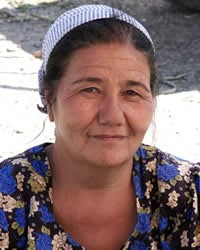Uzbek, Northern in China

Photo Source:
Fulvio Spada - Wikimedia
Creative Commons
|
Send Joshua Project a map of this people group.
|
| People Name: | Uzbek, Northern |
| Country: | China |
| 10/40 Window: | Yes |
| Population: | 13,000 |
| World Population: | 34,573,900 |
| Primary Language: | Uzbek, Northern |
| Primary Religion: | Islam |
| Christian Adherents: | 0.50 % |
| Evangelicals: | 0.29 % |
| Scripture: | Complete Bible |
| Ministry Resources: | Yes |
| Jesus Film: | Yes |
| Audio Recordings: | Yes |
| People Cluster: | Uzbek |
| Affinity Bloc: | Turkic Peoples |
| Progress Level: |
|
Introduction / History
The name Uzbek probably came from Ozbeg Khan, a Mongol ruler of the Golden Horde who spread Islam throughout many parts of the Empire in the fourteenth century. Those who remained in the area under Ozbeg Khan's rule became known as Uzbeks. Previously, they were lumped in with the Kazakhs.
Uzbek history in China dates back to the time of the Mongol hordes who dominated Central Asia and China in the thirteenth century. The Uzbek in China are descended from traders who traveled along the Silk Road. Others arrived in the 1750s after the Chinese armies defeated the Jungars.
The population of the Uzbeks in China have varied greatly over the course of recent decades. In 1953 there were more than 13,600 Uzbeks in China. By the 1964 census, however, their numbers had dwindled to only 7,700: many Uzbeks chose to flee to the Soviet Union to escape from Mao Zedong's extreme policies. As China's persecution of Muslim peoples continues, the Uzbeks are likely to flee to Uzbekistan.
What Are Their Lives Like?
The Uzbek's Islamic faith permeates every area of their daily lives. Funerals are major events in Uzbek society. The dead person's children stay in mourning for a full seven days. Forty, 70, and 100 days after a death, Muslim priests are called to chant portions of the Koran inside the home of the grieving family.
What Are Their Beliefs?
For centuries the Muslim clergy have been responsible for the religious and secular education of Uzbek children. When the Chinese announced that all children in China were required to attend a state school, the Uzbek people were outraged and refused to send their children to be educated by an atheistic regime. The Uzbek are committed Muslims, perhaps more so than any of the other Muslim peoples in Xinjiang.
There are an estimated 50 Uzbek Christians in China today - significant considering the strength of Islam among the Uzbek. Most Uzbek, however, are completely unaware of the gospel. The Uzbek in China are a difficult group to reach for Christ because of their small numbers and close-knit communities. A breakthrough has started to occur in Uzbekistan, however. More than 46 churches have been planted in recent years. In 1996, 40 Uzbek believers volunteered to become church planters in the countries of Central Asia.
What Are Their Needs?
The Northern Uzbek people need to accept the warm embrace of the only Savior so they can enjoy spiritually meaningful lives.
Prayer Points
Pray for the authority of Christ to bind hindering spiritual forces to lead them from darkness to light.
Pray for signs and wonders to happen among them and for great breakthroughs with a rapid multiplication of disciples and house churches.
Pray for bold workers who are driven by the love of the Holy Spirit to go to them.
Pray for an unstoppable movement to Christ among them.